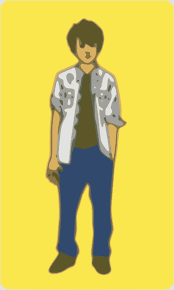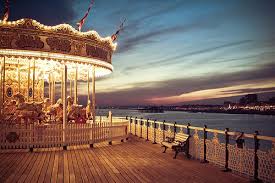
Ill mannered boy Holden was. Bad mouthed and careless. Cynical as can be and full of "anger" or what seemed to be such. Maybe confusion disguised as the anger perceived by the reader. In need of direction...or love. The complexity of the character gives the freedom a reader needs to understand the character and read the story through their eyes. The connection between Holden and the reader was a strange one though for rare is the soul who identifies with his peculiar being of fiction.

Yet still the strange boy had a story much like all other teenage boys. A story not pleasantly told by Holden. A younger brother whose death at the hands of leukemia haunts Holden. Allie's mit with the poems written on it is a memory told by Holden.

Not satisfied with the mundane, Holden decides to leave his former school Pencey after a fight with another student of which he wasn't exactly victorious. Bags packed and mind resolved he spends a few days in New York while winter break passes. On a train he meets the mother of one of his "phony bastard" classmates and talks wonders of him to her. Reason for pleasing her isn't clear but the mind of Holden can only be deciphered if the mind of the reader is open and creative.

Holden stays at a hotel in Manhattan and is intrigued by the doings of people he can see from him room window. He sees a man dressing up as a woman and is both disgusted and aroused at the sight of a man and woman engaging in what he thinks is foreplay. With this in mind he calls up a woman he believes to be a stripper and soon changes his mind. Holden's mind is filled with strange yearnings and to a certain point is looking for love with a preference on the sexual side if it.

Holden thinks back to the old days when him and Jane were together. They used to go out to the movies and held hands but it never went anywhere from there. Again, Holden was denied love from Jane. She didn't think much of Holden other than them being friends. Holden was used for comfort but he was never given any. He grew up with a feel of indifference towards those who couldn't give him what he was looking for.

Holden goes to a bar but leaves soon after finding one of his brothers former girlfriends. He has a prostitute sent up to his room but can't carry out the deed. He pays her but ends up beat up and stolen from. He is once again alone and neglected. Holden wakes up and goes in search of his sister Phoebe in Central Park. When he has no success finding her he decided to go back to the hotel and meet up with Sally. Holden's life at this point is completely convoluted. He doesn't know what his life will turn out to be nor does he care because right now he doesn't even understand who he is. All he knows is has been kicked out of school and want to make time pass while his parents get the news.

Holden meets up with Sally but upsets her when he offends her for not wanting to run away with him. Holden passes the time watching a movie while he waits to meet up with a counselor, Luce that has gone on to Columbia University. They start discussing sexual issues but Holden soon upsets Luce as well and Luce leaves promptly laving Holden alone once again. Holden has a tendency or need to push those who come close to him away. He is cynical about it and pushes them away in the most offensive of ways. He continues to call Jane but can't get a hold of her.

Holden sneaks into his house and tells his sister what has happened. She nags at him and he leaves once again. He goes to a former teachers house but thinks he is trying to make a homosexual move on him and leaves soon after. He lets his sister know that he is leaving forever and she packs her things and wants to leave with him. He says no and takes her to a carousel. He stands there watching her while rain pours and he tells the audience of his optimistic view of his future. Holden finds the love he has been searching for in the most unexpected of places, his sister. He had love close all along but was blinded by his strange way of thinking and went off to look for love in all the wrong places.
